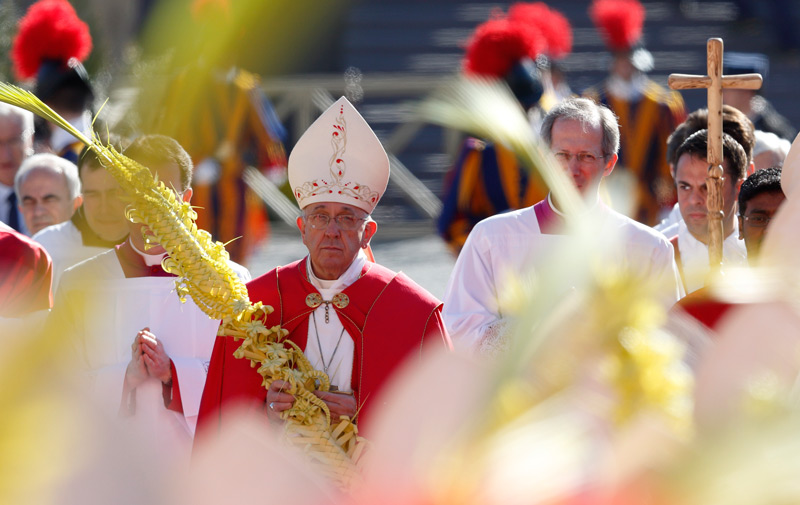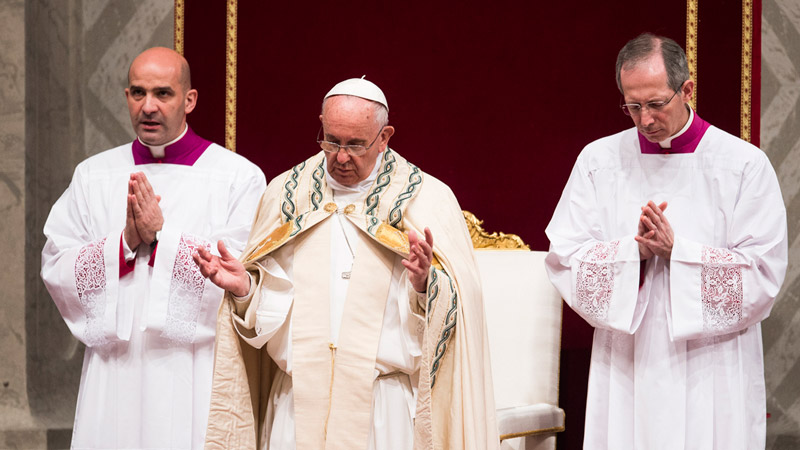
Q: What message in “Amoris Laetitia” gives you the most joy and hope for the future of the Church?
Archbishop Paglia: The clear message of “Amoris Laetitia” is that the Church itself must be a family.
We need a new way of living in our Christian communities: they must be less anonymous and more like families. This means working for true pastoral conversion, a conversion that is built on a real alliance between families and the whole Christian community.
Too often the family is not very Church-oriented and the Church is not attentive to families. Both need to go “outside themselves”: families need to become less self-involved and the Church needs to become less bureaucratic. Together, they are called to live a new missionary zeal.
In a society where loneliness, neglect, indifference and violence are on the rise, there is need for a “Church as Family,” a Church that welcomes families, and that helps them to become a ferment that results in a society that is less violent and more supportive of its members.
The Holy Father sees the family as crucial, viewing it not as a collection of individuals with separate interests, but rather as a reality that is integral to human history.
The covenant between man and woman is not a private matter, it is public. It is not all romance — not a “My Blue Heaven” — it is where the living fabric of society is woven; and when all is well between men and women, all is well in society as a whole.
Q: How do you feel the new structuring of life, marriage and family at the Vatican will assist the Church? What is your role in this new and collaborative model?
Archbishop Paglia: The creation of a new Dicastery for the Laity, Family and Life was not an accident. The Holy Father wanted to confirm the Church’s “new” care for families that was evident in the recent Family Synods.
The original Pontifical Council for the Family was created by St. John Paul II at the end of the 1980 Synod on the Family; and with that example, Pope Francis wanted to follow up the recent Family Synod by creating a pastorally-oriented dicastery able to address in a unified manner the great anthropological challenges in the modern world.
On the other hand, the institutes that I lead — The Pontifical Academy for Life and the John Paul II Institute for Studies on Marriage and Family — cooperate with each other and with the new dicastery to provide a scientific and academic basis for the Church’s pastoral outreach to the modern world in the developing life and family-oriented areas of bioethics, biotechnology, human ecology, genetics, and so forth.
This new structure reflects the Church’s commitment to entering without fear into the contemporary debate on life and family issues with the goal of building a supportive society that respects every person and leaves no one behind.
Q: Reading the document through the eyes of faith and in harmony with sacred Scripture and tradition, I do not see any changes in the Church’s teachings, including the reception of Holy Eucharist. Is this perception correct, or is there a discussion on change?
Archbishop Paglia: There has been no change in the Church’s doctrine, but, without departing from tradition, there has been a deepening, or put another way, a deeper understanding, of that doctrine. In this framework, it can be said that the Synod document is following the trail blazed by St. John Paul II in his Magisterial 1981 family Exhortation Familiaris Consortio.
The eighth chapter of Amoris Laetitia deals with long-discussed questions related to marital break-down and the hurt it causes. The Pope — following the teaching of his predecessors — urges us to integrate persons undergoing these trials ever more fully into the life of the Church.
The title of chapter eight sets out the approach to take: “Accompany, Discern, Integrate Weakness.” These three words let us know that the answer to weakness can never be indifference.
The Church is equal to its task as a shepherd, that is, to leading its flock to greener pastures. It discerns and then integrates by accompanying.
This is the point that seems to cause the most concern because it risks being simplified and misunderstood, but moral-theological tradition can help to clarify these ideas, and even those who are troubled by the words of Amoris Laetitia realize that the Magisterium wants to put pastoral practice back on track.
Thus, no change in doctrine, but rather more room for pastoral concern to carry out its task of helping persons to grow in their spiritual life — acting gradually as God does — until they arrive at full communion with Jesus. The first “Body of Christ” that must nourish these persons (and everyone else) is actually participation in the life of the Christian community.
In this regard, accompaniment and integration means things like listening to the Gospel, serving the poor, taking part in the Mass and witnessing the Gospel.
Q: Since we are made for communion, accompaniment is important in the Christian journey, especially for those who feel lonely or dejected. The Holy Father uses this image frequently. Could you describe what that accompaniment should entail? If fraternal correction is necessary, what recommendation would you make so that truth is expressed in a way that it would be received in charity and integrity?
Archbishop Paglia: We are called to accompany people as they grow spiritually, doing more than simply repeating abstract platitudes.
All of us, however, are on a journey: pastors and couples, people who live their marriages joyfully as well as those who suffer through them, and those who are scarred by deep hurts.
If the Gospel tells us that “no one can be condemned for ever” (Amoris Laetitia 297), the task of integrating persons means helping them find the best way to participate in the Christian community.
It will not be the same for everyone, but neither can it be a priori permanent exclusion.
Shared initiatives will lead to increased and deeper forms of integration and of ecclesial communion. Discernment requires patient work to understand the differences between one situation and another. Accompaniment leads to overcoming unfair forms of exclusion and to appreciating the human, moral and ecclesial condition of others. This requires pastors to be committed companions on the journeys these persons have undertaken.
This cannot be a “do it yourself” undertaking, and it cannot be closed off from the rest of the community. Every path is different and needs to be treated on its own terms.
In short, the pope urges priests to be priests, to accompany, and not to be judges from whom there is no appeal.
Amoris Laetitia provides some guidelines: Those who live in irregular situations, if they accept being accompanied in a shared faith journey in the Christian community (especially if the process is promoted and guided by the bishop), will be able to encounter various and gradual forms of integration, not excluding sacramental integration.
Q: Across cultural differences, we seem to be losing young adults (ages 20-40) from practicing the faith. They are not as likely to marry or start a family. Many issues contribute to this situation, but could you name one or two major causes from your perspective and ways to bring our young people back?
Archbishop Paglia: This is your last question, but it should be the first.
Unfortunately, I don’t see much concern about this situation. At most, people are sad that young people don’t get married. Some, unfortunately, blame the situation on young people themselves. That is wrong.
We adults, both believers and non-believers, should ask ourselves what example we give in respect to the family and marriage.
Doesn’t the question of why young people don’t get married, but rather prefer to simply live together, also require us to explain how well we preach the Gospel of Holy Matrimony and the Family to our young people? Do we make marriage and raising a family attractive? Why do so many young people put off marriage and think that “till death do them part” no longer makes sense?
I believe we need to think about the vocation and mission of marriage and the family more carefully. And likewise to reexamine marriage preparation, a process that is not really doable outside of the Christian community.
In addition, it is essential to accompany young couples after they marry. Here too, connection with the Christian community is indispensable, no matter where the young couple sets up its home.
In summary, Amoris Laetitia, rather than formulating a new approach to the pastoral care of families, is only asking that it become much more family oriented.
By Kathy Schmugge / Special to The Miscellany
Editor’s note: Kathy Schmugge is director of the Office of Family Life for the Diocese of Charleston. She interviewed Archbishop Vincenzo Paglia, president of the Pontifical Council for the Family, on the apostolic exhortation “Amoris Laetitia” by email.



